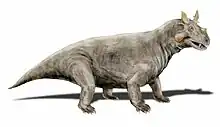| Brithopus Temporal range: Middle Permian, Ufimian | |
|---|---|
 | |
| Scientific classification | |
| Domain: | Eukaryota |
| Kingdom: | Animalia |
| Phylum: | Chordata |
| Clade: | Synapsida |
| Clade: | Therapsida |
| Suborder: | †Dinocephalia |
| Family: | †Brithopodidae |
| Genus: | †Brithopus Kutorga, 1838 |
| Species: | †B. priscus |
| Binomial name | |
| †Brithopus priscus Kutorga, 1838 | |
| Synonyms | |
| |
Brithopus is an extinct genus of dinocephalian therapsids. It contains a single species, Brithopus priscus, known from fragmentary remains found in the Copper Sandstones near Isheevo, Russia.
Description
Brithopus was fairly large, reaching a length of 2.5–3 m (8–10 ft).[1] The skull was similar to Titanophoneus, but more massive and heavily built.[2]
Classification
B. priscus was first named in 1838 and was traditionally classified in the Anteosauria, a group of carnivorous dinocephalians. Brithopus served as the basis for the family Brithopodidae, which once included many anteosaurian species. Because it is based on fragmentary material, Brithopus is regarded as a nomen dubium by some researchers. Brithopus was later considered a possible estemmenosuchid,[3] a type of herbivorous tapinocephalian therapsid.[4]
Dinosaurus and Eurosaurus have both been considered synonyms of Brithopus.[5]
See also
References
- ↑ "Palaeos Vertebrates Therapsida: Anteosauria". palaeos.com. Retrieved 12 April 2018.
- ↑ Olson, E.C. (1962). "Late Permian terrestrial vertebrates, U.S.A. and U.S.S.R." Transactions of the American Philosophical Society, New Series, 52: 1–224.
- ↑ Kammerer, C. F. 2010. Systematics of the Anteosauria (Therapsida: Dinocephalia). Journal of Systematic Palaeontology, 9, 261-304.
- ↑ Kammerer, C.F. (2011). "Systematics of the Anteosauria (Therapsida: Dinocephalia)". Journal of Systematic Palaeontology. 9 (2): 261–304. doi:10.1080/14772019.2010.492645. S2CID 84799772.
- ↑ Battail, B., and Surkov, M. V. (2000). "Mammal-like reptiles from Russia." The Age of Dinosaurs in Russia and Mongolia, 86-119.
External links

